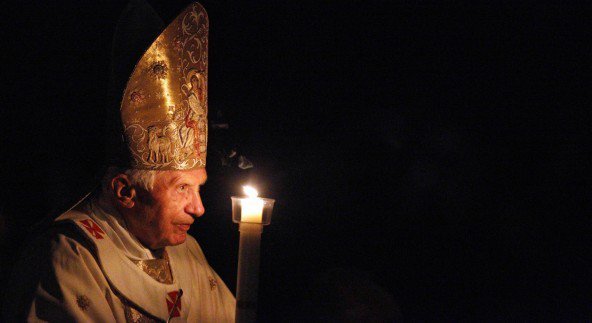You may remember violent protests breaking out in 2006 across the Muslim world (and tantrums in the secular press) in response to a speech given by Pope Benedict XVI in Regensburg, Germany.

Muslim students burn an effigy of Pope Benedict XVI at a protest rally in Allahabad, India. Photo: Rajesh Kumar Singh/AP
Ironically, the 2006 violence across the Middle East was to protest a speech that was about, at least in part, the scandal of justifying violence in the name of religion. Pope Benedict’s speech was brilliant for many reasons, and it’s a shame that secular media spin and Muslim violence obscured its erudition. But as the years have rolled on and attacks from Muslims around the globe have increased, most recently in the bombing of the Russian passenger jet and the attacks in the heart of Paris, a revisiting of Benedict’s speech is in order. Throughout his pontificate, the left loved to portray Benedict as hopelessly behind the times, but this address shows us today how ahead of the curve he actually is. When it’s all said and done, what’s really more important: the ability to post, tweet and snap selfies, or to be able to identify and speak honestly about existential threats to our civilization? I think I’ll go with the latter.
Benedict poses some fundamental questions that have been batted around for centuries.
What is the role of reason in religion? Are the two opposed or allied? Is God so transcendent, so far beyond our ability to comprehend Him, as Muhammad and Duns Scotus believed, that reason itself is but clay in his hands to mold as He wishes? Is God’s nature to be understood as raw, all-powerful and capricious Will? Could God command me to do something irrational? Would that act then be good, since God willed it?
Or, is God Himself Reason–Logos? The Church, of course, sides with Aquinas and, by extension, Aristotle and not with Scotus or Muhammad on this pivotal question. As Benedict explains, God’s will does not transcend reason. He cannot contradict Himself.
In his address, Benedict joins the Revelation of the Old Covenant to Christ’s status as the eternal Logos (or Word) and Reason of God. He goes on to posit: Does our sharing in that reason, by virtue of our intellect, therefore make God accessible to us in some way, however limited? If so, what are the implications for our own actions in relation to the Creator, the Logos? Can irrational acts be, in any way, pleasing to God, who is Logos? Benedict answers in the tradition of the Church: No! God is not pleased with acts of violence that are done in His name, since such acts violate His very nature–Reason. This past Sunday, Pope Francis, reflecting on the horrible attacks in Paris was correct when he said that such acts of violence done in God’s name are blasphemous.
But that’s exactly what we’re seeing more and more of these days: violence, mass murder and terror all done in the name of a particular religion. No, of course not every Muslim is a terrorist. That’s not the point. But it is a fact that large-scale, appalling acts of violence inspired by Islam are not going away or decreasing. They are becoming more commonplace. When do we start admitting that we’ve gone beyond isolated incidents? It’s fair to start asking, in a prudent and direct way, questions about the core tenets of Islam. And it’s time to definitively drop the self-destructive p.c. fear filter imposed on us by a secular, anti-Christian pop culture. Did you ever read what some of our greatest Saints have said about Islam? Eiffel Tower peace signs and teary lectures from a way-past-her-prime Madonna on loving everyone won’t get us anywhere in our dealings with this threat.
Oh, while we’re at it, it’d be nice if the elites in the West would send Benedict XVI a big I’m sorry, we were wrong note with some German chocolates.



